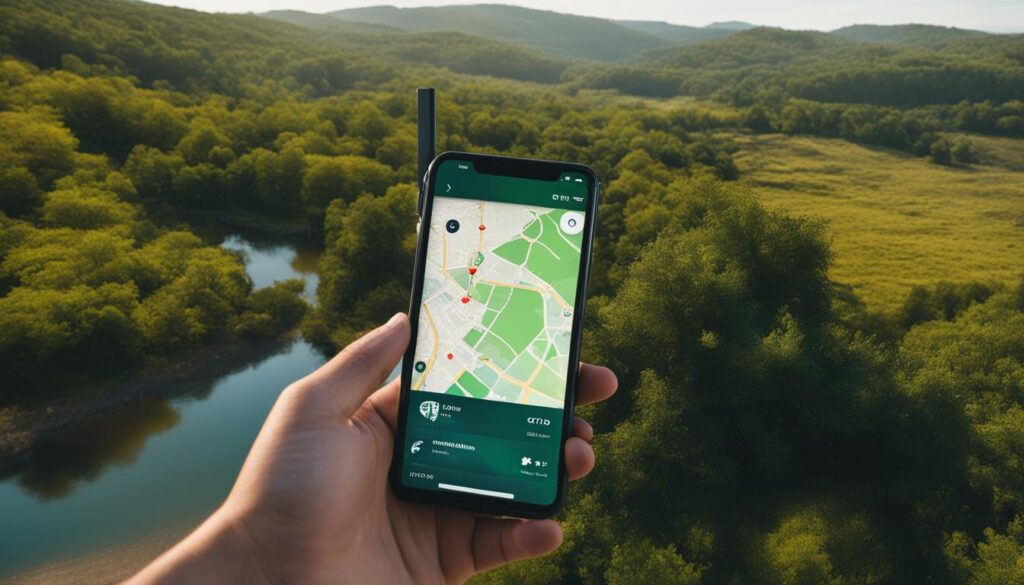Imagine being able to gather data, access information, and complete tasks even in remote locations or areas with limited internet connectivity. Sounds too good to be true, right? Well, with offline capabilities in field work apps, this is now a reality.
Field work apps with offline capabilities offer numerous advantages that revolutionize the way organizations operate in challenging environments. Whether you’re in the construction industry, conducting surveys, or performing maintenance tasks, the benefits of offline mode extend far beyond convenience.
Curious to learn more about the advantages of offline capabilities in field work apps? Let’s dive in and explore how this feature enhances productivity, efficiency, and reliability for field workers.
But first, take a look at the image below to get a visual representation of how offline capabilities can empower field workers:

Key Takeaways:
- Offline capabilities in field work apps enable data collection, access, and completion of tasks in areas with limited internet connectivity.
- Offline mode enhances productivity, efficiency, and reliability for field workers.
- Field work apps with offline capabilities revolutionize operations in challenging environments.
- Offline capabilities extend beyond convenience and offer significant advantages in various industries.
- Discover the hidden benefits and future potential of offline capabilities in the upcoming sections.
Understanding Offline Capabilities in Modern Field Work
In today’s fast-paced world, where connectivity is often taken for granted, offline capabilities play a crucial role in modern field work. Field workers encounter various challenges, such as remote locations with limited or no internet access. That’s where offline mode becomes essential, enabling field workers to perform critical tasks without relying on a constant internet connection.
Defining Offline Mode and Its Importance
Offline mode refers to the ability of field work apps to function without an active internet connection. This feature allows field workers to access and update data, complete forms, capture images, and perform other essential operations even when offline. It ensures that field workers can continue their work seamlessly in areas where connectivity is unreliable or nonexistent.
Offline mode is of utmost importance in field work as it eliminates dependency on consistent connectivity, making field workers more self-reliant and efficient. It allows them to collect, review, and update data in real-time, regardless of their location or access to the internet. By minimizing disruptions and downtime, offline mode significantly enhances productivity and streamlines field operations.
The Evolution from Paper-Based to Digital Field Service Solutions
The transition from paper-based to digital field service solutions has revolutionized the industry, empowering field workers with new capabilities and transforming how they carry out their tasks. In the past, field workers had to rely on paper forms, manual data entry, and extensive paperwork, which were time-consuming and prone to errors.
With the advent of digital field service solutions, powered by offline capabilities, field workers can now leverage mobile apps and cloud-based platforms to streamline their work processes. The shift from paper to digital has eliminated the need for physical forms and documentation, reducing administrative burdens and allowing field workers to dedicate more time to their core responsibilities.
Moreover, digital solutions provide real-time access to relevant information and enable seamless collaboration among field workers, supervisors, and back-office teams. Offline capabilities have transformed the way field work is conducted, increasing efficiency, accuracy, and overall performance.
Impact of Offline Functionalities on Productivity and Efficiency
In today’s fast-paced world, field work apps equipped with offline functionalities have revolutionized the way businesses operate in challenging environments. The seamless data collection and enhanced speed offered by offline access have significantly improved productivity and efficiency for field workers.
Seamless Data Collection in Challenging Environments
In challenging environments where connectivity may be limited or unreliable, offline functionalities play a crucial role in ensuring seamless data collection. Field workers can capture and store data without interruption, eliminating the need for constant internet connectivity.
By removing the dependency on internet access, field workers can focus on their tasks and collect data efficiently, even in remote or hazardous locations. This enables them to gather accurate information in real-time, leading to better decision-making and smoother workflows.
Enhanced Speed and Responsiveness with Offline Access
Offline access in field work apps brings enhanced speed and responsiveness to the table. With offline functionalities, field workers can access critical data and perform tasks quickly, without experiencing lag or delays caused by internet connectivity issues.
The ability to work offline ensures that field workers can complete their tasks in a timely manner, improving overall operational efficiency. They can access relevant information on-the-go, making fast decisions and delivering prompt service to customers.
Moreover, offline access enables field workers to work seamlessly, even in situations where connectivity may not be available or reliable. They can continue their work uninterrupted, irrespective of their location or the challenges posed by the environment.

Offline Capabilities
Essential Features for Reliable Offline Performance
When it comes to offline capabilities, having the right features is crucial for ensuring reliable performance in field work apps. These essential features allow field workers to seamlessly operate even without internet connectivity, enabling them to carry out their tasks efficiently. Here are some key features that contribute to reliable offline performance:
- Offline Data Syncing: The ability to synchronize data offline is essential for field workers to access the latest information and update their records, ensuring that they have the most up-to-date data at all times.
- Offline Maps and Navigation: A reliable field work app should have offline mapping and navigation capabilities, allowing field workers to locate their destinations and navigate without relying on an internet connection.
- Offline Form Submission: Field workers often need to fill out forms and submit them even in areas with limited or no connectivity. Offline capabilities should enable them to capture and submit data seamlessly, ensuring that important information is not lost.
- Data Caching: Caching data locally on the device allows field workers to access previously accessed information without the need for an internet connection. This improves efficiency and reduces waiting time for data retrieval.
Boosting Reliability and Trust in Field Service Apps
The Role of Data Integrity Without Connection
In the absence of a stable internet connection, maintaining data integrity becomes crucial for field service apps. Field workers rely on accurate and up-to-date information to carry out their tasks efficiently. Offline capabilities ensure that even without a connection, field workers can access reliable data, input new information, and synchronize it once connectivity is restored. By preserving data integrity, offline functionalities enhance reliability and build trust in field service apps.
Building Confidence in Digital Solutions Among Field Workers
Field workers often face challenges when adapting to digital solutions. However, by incorporating offline capabilities into field service apps, organizations can provide field workers with a seamless transition from traditional methods to digital workflows. The ability to work offline instills confidence in field workers by eliminating concerns about connectivity and ensuring uninterrupted productivity. By embracing digital solutions with offline capabilities, organizations can empower their field workers and enhance their overall experience in the field.

| Benefits of Offline Capabilities |
|---|
| 1. Reliable access to accurate data even without a connection |
| 2. Reduction in data entry errors and inconsistencies |
| 3. Increased efficiency and productivity for field workers |
| 4. Enhanced trust and reliability in field service apps |
| 5. Improved collaboration and communication between field workers and the office |
Empowering Field Technicians with Offline Features
In today’s fast-paced world, field technicians play a crucial role in various industries. Whether they are conducting inspections, performing repairs, or collecting important data, it’s essential for them to have access to the necessary information anytime and anywhere, even in remote locations with limited connectivity. This is where offline features in field work apps come into play, empowering field technicians with the ability to access data offline and enhance their productivity and efficiency.
The Advantage of Accessing Data Anytime, Anywhere
Offline features in field work apps provide field technicians with the advantage of accessing data anytime and anywhere. With offline capabilities, field technicians no longer have to rely on an internet connection to retrieve critical information or complete their tasks. They can access relevant data stored locally on their mobile devices, ensuring uninterrupted workflow and eliminating dependency on network availability.
Imagine a field technician who needs to access equipment manuals or customer information while onsite at a remote location. Without offline capabilities, they would be limited by the lack of connectivity. However, with offline features, they can effortlessly retrieve the necessary data from their device, enhancing their ability to deliver efficient and high-quality service.
Furthermore, offline access provides a sense of reliability and assurance for field technicians. They can rely on the availability of data regardless of the connectivity status, allowing them to perform their tasks confidently and effectively. This improves overall job performance and contributes to customer satisfaction.
Examples of Offline Usage in Remote Locations
Offline features have proven to be invaluable for field technicians working in remote locations. These areas often have limited or no internet connectivity, making it challenging to access real-time data. However, with offline capabilities, field technicians can continue to perform their tasks efficiently, ensuring smooth operations even in remote and isolated environments.
Let’s consider an example from the renewable energy sector. Field technicians responsible for maintaining wind turbines often work in remote locations, such as offshore wind farms. These environments pose significant connectivity challenges. However, with offline features in their field work apps, technicians can access turbine performance data, diagnostic information, and maintenance instructions offline. This enables them to perform their inspections and repairs seamlessly, ensuring the consistent and reliable operation of the turbines.
Another example is in the healthcare industry. Mobile healthcare units that provide medical services in rural or underserved areas often face limited connectivity. However, with offline features, healthcare professionals can access patient records, medical guidelines, and drug information offline, allowing them to deliver crucial medical services without interruptions.
These examples highlight the practical applications and benefits of offline features in field work. By empowering field technicians with offline capabilities, organizations can ensure the continuity of operations, enhance the efficiency of field work, and ultimately improve customer satisfaction.
| Industry | Scenario | Offline Benefit |
|---|---|---|
| Renewable Energy | Wind turbine maintenance in remote locations | Access to turbine data and maintenance instructions offline for uninterrupted inspections and repairs |
| Healthcare | Mobile healthcare units in rural areas | Access to patient records, medical guidelines, and drug information offline for seamless service delivery |
Considering the Right Mobile Software for Offline Scenarios
In today’s digital world, having mobile software that supports offline scenarios is crucial for field work operations. When choosing the right mobile software for your organization, there are a few key capabilities to look for in offline-compatible apps. Additionally, it’s important to test the reliability of these solutions before full deployment to ensure seamless offline functionality. Let’s explore what to consider when selecting mobile software for offline scenarios and how to ensure its reliability.
Key Capabilities to Look for in Offline-Compatible Apps
When evaluating mobile software for offline scenarios, there are several key capabilities that are essential for ensuring optimal performance:
- Data synchronization: The ability to synchronize data seamlessly when the device connects to the internet is crucial for maintaining accurate and up-to-date records.
- Data caching: Offline-compatible apps should have the ability to cache data locally, allowing field workers to access information even when there is no connectivity.
- Offline data capture: The app should offer the capability to capture data while offline, ensuring that field workers can continue their work without interruption.
- Offline data storage: It’s important that the app has robust offline data storage capabilities to ensure that data collected in the field is secure and easily accessible.
- Conflict resolution: In the event of conflicting data changes, the app should have built-in mechanisms for resolving conflicts and maintaining data integrity.
By prioritizing these key capabilities, organizations can ensure that their mobile software is equipped to handle offline scenarios effectively, enabling field workers to operate smoothly even without internet connectivity.
Tips for Testing Solution’s Reliability Before Full Deployment
Before deploying mobile software with offline capabilities across your organization, it’s crucial to test the reliability of the solution. Here are some tips to ensure that the software performs seamlessly in offline scenarios:
- Simulate offline environments: Test the software in a controlled environment where connectivity is limited or nonexistent to evaluate its performance and responsiveness.
- Check data synchronization: Verify that data synchronization occurs accurately when the device reconnects to the internet, ensuring that all offline data captured is properly updated.
- Perform stress testing: Put the software under heavy usage and assess its performance and stability in challenging scenarios to identify any potential issues.
- Consider edge cases: Test the software in various unpredictable scenarios that may occur during field work to ensure that it can handle unexpected situations effectively.
- Solicit user feedback: Engage field workers in the testing process and gather their feedback on the software’s usability and reliability, incorporating their insights into the evaluation.
By following these testing tips, organizations can gain confidence in the reliability of their chosen mobile software before fully deploying it to the field, ensuring a smooth transition and uninterrupted workflow for their field workers.

Testing the reliability of mobile software before full deployment is essential to ensure a seamless experience for field workers in offline scenarios.
Streamlining Offline Access to Optimize Field Operations
In order to optimize field operations, organizations need to streamline offline access in their field work apps. By enabling offline functionality, organizations can simplify workflows for field workers and significantly improve their overall efficiency and productivity.
Offline functionality allows field workers to access important data and perform critical tasks even in areas with poor or no internet connectivity. This eliminates the dependency on a stable internet connection, ensuring that field operations can continue seamlessly regardless of the location.
Through offline functionality, field workers can retrieve, update, and sync data on their mobile devices without having to rely on real-time connectivity. This simplifies their workflows by eliminating delays caused by connectivity issues and allows them to focus on their tasks at hand.
Additionally, offline functionality enhances data security as field workers can securely store and access sensitive information directly on their devices. This reduces the risk of data breaches and ensures that confidential data remains protected even in remote or off-grid locations.
Simplifying Workflows for Field Workers through Offline Functionality
Offline functionality not only simplifies workflows for field workers but also improves the overall user experience. Without the need for constant internet connectivity, field workers can easily access and input data, perform tasks, and complete forms or reports directly on their mobile devices.
Tasks such as capturing customer information, conducting inspections, updating service orders, or accessing product details can be seamlessly carried out offline. This eliminates the need for manual paper-based processes, reducing errors, saving time, and improving overall efficiency.
In addition, the ability to work offline enables field workers to collaborate more effectively with their team members. They can share and sync data between devices once they regain internet connectivity, ensuring that everyone has access to the most up-to-date information.
Case Studies: Improvements Brought by Offline Field Apps
Several organizations have already experienced significant improvements in their field operations by leveraging offline field apps. Let’s take a look at some case studies:
| Company | Challenge | Solution | Results |
|---|---|---|---|
| ABC Construction | Field workers struggled with slow and unreliable internet connectivity at construction sites. | Implemented an offline field app that allowed field workers to access and update project information offline. | Improved productivity by 30% as field workers no longer had to wait for internet connectivity to perform their tasks. |
| XYZ Utilities | Field technicians faced challenges in accessing customer data and completing service orders in remote areas. | Adopted an offline field app that enabled technicians to access and update customer information offline. | Reduced service order completion time by 40% and improved customer satisfaction due to faster response times. |
| 123 Logistics | Delivery drivers experienced difficulties in updating and syncing delivery details during long-haul trips with limited connectivity. | Used an offline field app that allowed drivers to input and sync delivery information offline. | Reduced manual paperwork by 60% and improved inventory accuracy by eliminating data entry errors. |
These case studies demonstrate the tangible improvements that can be achieved by incorporating offline field apps into field operations. The simplified workflows and enhanced productivity resulting from offline access can significantly impact the success and efficiency of organizations across various industries.
Addressing the Hidden Benefits of Offline Field Work Apps
In today’s digital age, offline capabilities in field work apps offer numerous hidden benefits that contribute to the seamless and efficient operation of field workers. While the obvious advantage lies in overcoming connectivity limitations, offline mode also brings about consistency and convenience, as well as efficiency and security advantages.
How Offline Mode Contributes to Consistency and Convenience
Offline mode ensures that field workers can perform their tasks without interruptions, even in areas with limited or no internet connectivity. By eliminating reliance on continuous data transmission, offline field work apps provide a consistent user experience regardless of the availability of network connections. This consistency allows field workers to maintain their workflow and productivity levels, ensuring that critical tasks can be completed on time.
Moreover, the convenience of offline mode lies in the flexibility it offers. Field workers no longer need to worry about being tethered to a stable internet connection to perform their duties. They can access and interact with data anytime and anywhere, even in remote or challenging locations, enhancing their ability to carry out their work efficiently.
Discussing the Efficiency and Security Advantages
Offline capabilities in field work apps also deliver significant efficiency advantages. By eliminating the need for real-time data communication, offline mode reduces the reliance on network speeds and latency. This improved speed and responsiveness enable field workers to complete tasks faster and make more informed decisions based on real-time data.
Additionally, offline mode provides security advantages. Sensitive data stored within the app is not transmitted over potentially insecure networks, reducing the risk of data breaches and unauthorized access. Offline field work apps ensure that data remains within the secured device until connected to a trusted network for synchronization, safeguarding the integrity and confidentiality of critical information.

| Advantages of Offline Field Work Apps | |
|---|---|
| Consistency | Perform tasks without interruptions |
| Convenience | Access data anytime, anywhere |
| Efficiency | Improved speed and responsiveness |
| Security | Protects sensitive data |
Enhancing the Customer Experience with Offline Data Accessibility
Offline data accessibility plays a crucial role in enhancing the overall customer experience. By enabling field workers to access data even without an internet connection, companies can ensure prompt and accurate service delivery to their customers. Real-time data synchronization is a key feature that allows field workers to update and retrieve information in real-time, ensuring that customers are provided with the most up-to-date and relevant information.
With real-time data synchronization, field workers can immediately input data and sync it with the central database once they regain internet connectivity. This ensures that the information is readily available to other team members and can be accessed by customer service representatives to better assist customers. By eliminating the delays and inefficiencies caused by manual data entry and manual synchronization, real-time data synchronization improves service delivery and ensures a seamless customer experience.
Incorporating customer feedback is another important aspect of refining offline experiences. Companies can gather customer feedback through various channels, such as surveys, feedback forms, or direct communication. This feedback can then be used to improve offline features, address pain points, and enhance the overall customer experience. By actively listening to customer feedback and implementing necessary changes, companies can ensure that their offline experiences are tailored to meet customer needs and expectations.
Overall, enhancing the customer experience with offline data accessibility requires a combination of real-time data synchronization and a customer-centric approach. By leveraging these capabilities and incorporating customer feedback, companies can deliver exceptional service even in challenging offline environments.
Conclusion
After exploring the advantages and benefits of offline capabilities in field work apps, it is clear that these features are a necessity for Philippine SMEs. The ability to operate in challenging environments with limited or no connectivity is crucial for small and medium-sized enterprises to ensure uninterrupted productivity and efficiency.
Offline capabilities enable seamless data collection in challenging environments, ensuring that field workers can continue their tasks without interruptions. The enhanced speed and responsiveness offered by offline access further optimize field work operations, enabling workers to perform their duties more effectively.
Looking ahead, offline features will continue to play a vital role in field work. As technology advances, the ongoing relevance of offline capabilities in field work is undeniable. There is great potential for further advancements in this area, which will further enhance the efficiency and effectiveness of field work operations for Philippine SMEs.
FAQ
What are the advantages of offline capabilities in field work apps?
Offline capabilities in field work apps enhance productivity and efficiency for field workers. They enable seamless data collection in challenging environments and ensure reliable performance even in locations with no or low connectivity. Offline access also improves speed and responsiveness, allowing field workers to perform tasks effectively.
What is offline mode in field work apps and why is it important?
Offline mode in field work apps allows users to operate without internet connectivity. It ensures that field workers can continue working in locations with limited or no network coverage. Offline mode is important as it enables data collection and app functionality in remote areas, enhancing field work operations.
How have offline capabilities revolutionized the field service industry?
The field service industry has transitioned from paper-based to digital solutions. Offline capabilities have played a significant role in this transformation by allowing field workers to perform tasks digitally even without internet access. This has improved efficiency, accuracy, and overall productivity in field work.
What are the benefits of seamless data collection in challenging environments?
Seamless data collection in challenging environments, enabled by offline capabilities, ensures that field workers can collect information without interruptions. This is particularly useful in areas with limited or no connectivity. It allows for the efficient and accurate capture of data, improving field work outcomes.
How does offline access enhance speed and responsiveness in field work?
Offline access enables field workers to access data and perform tasks quickly, without depending on real-time internet connectivity. This enhances speed and responsiveness, allowing field workers to complete their tasks efficiently. It eliminates delays caused by network issues and ensures smooth operation even in remote locations.
What are the essential features required for reliable offline performance?
To ensure reliable offline performance, field work apps need features such as offline data storage, offline data synchronization, offline form filling capabilities, and offline map functionality. These features enable field workers to seamlessly operate without internet connectivity, ensuring they can access and update data even offline.
How do offline capabilities boost reliability and trust in field service apps?
Offline capabilities contribute to reliability and trust in field service apps by ensuring data integrity even in the absence of a connection. Field workers can rely on accurate and up-to-date information, which is crucial for making informed decisions and providing quality service. This builds trust in digital solutions among field workers, improving their overall experience.
What advantage do offline features provide for field technicians?
Offline features empower field technicians by allowing them to access data anytime and anywhere, even in remote locations with limited connectivity. This improves their ability to perform tasks efficiently by providing them with the necessary information and tools even in offline scenarios.
How can organizations choose the right mobile software for offline scenarios?
When choosing mobile software for offline scenarios, organizations should look for key capabilities such as offline data synchronization, offline data storage, offline map functionality, and offline form filling. It is also important to test the reliability of the offline solution before full deployment to ensure it meets the specific requirements of field work.
How does offline functionality streamline workflows for field workers?
Offline functionality simplifies workflows for field workers by eliminating dependencies on real-time connectivity. Field workers can access and update data, complete forms, and perform tasks offline, reducing downtime and improving overall efficiency. This streamlining of workflows enhances productivity and improves the overall field work experience.
What are the hidden benefits of offline field work apps?
Offline field work apps provide consistency and convenience by allowing field workers to seamlessly perform tasks without interruptions caused by connectivity issues. They also contribute to efficiency and security by ensuring that operations can continue even in offline scenarios, and data remains protected. These hidden benefits improve overall operations and protect sensitive data.
How does offline data accessibility enhance the customer experience?
Offline data accessibility enhances the customer experience by enabling real-time data synchronization. Field workers can provide prompt and accurate information to customers, improving service delivery. Incorporating customer feedback helps refine offline experiences, ensuring that their needs and expectations are met.
